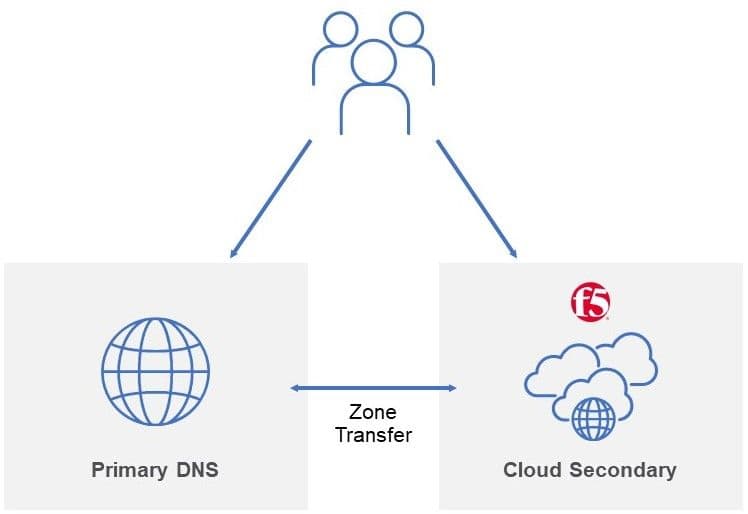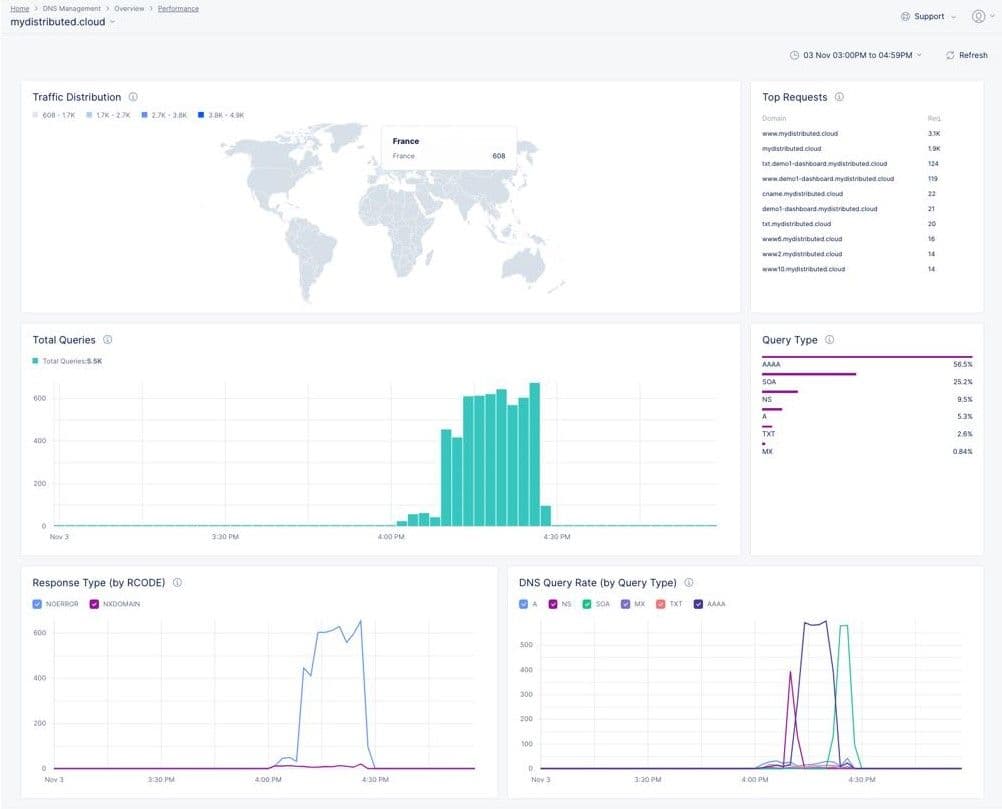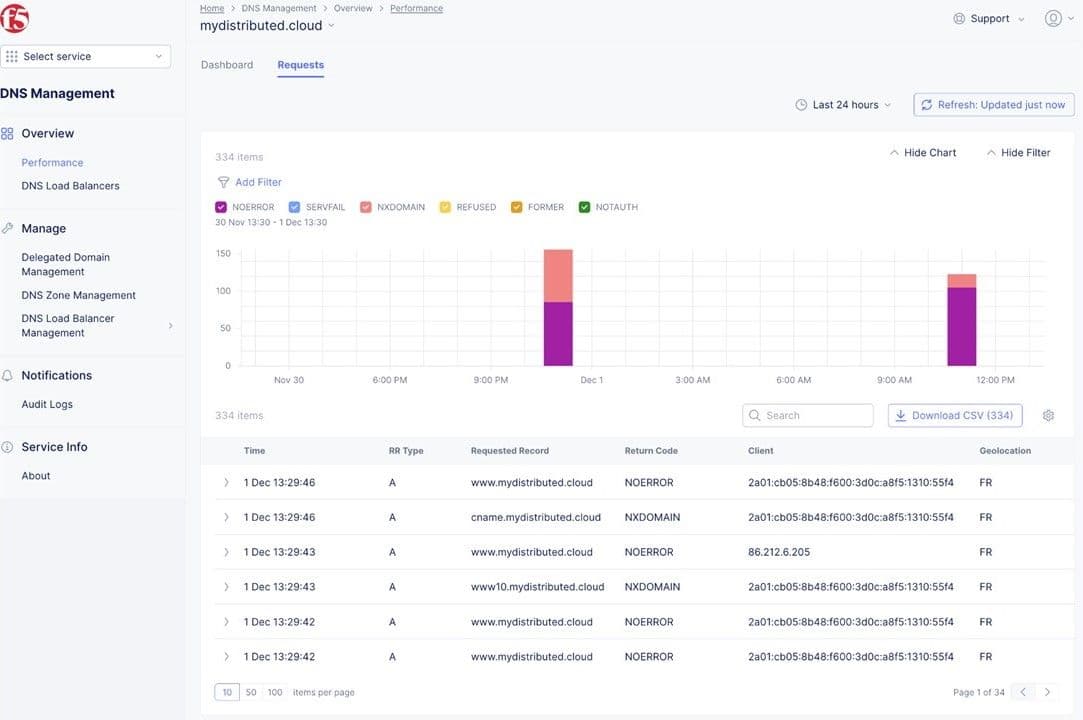Outsourcing doesn’t have to be controversial or painful, especially when it comes to outsourcing Domain Name System (DNS) needs to a provider that specializes in DNS services for multi-cloud, edge, and on-premises environments. You can actually realize benefits that are quite the opposite of “painful” and “controversial.” What does this mean for your business? Cost and time savings without eliminating IT jobs.
But why outsource in the first place? Maintaining DNS services like hosting, record maintenance, or security in-house means keeping more control over that service, which is a good thing, isn’t it? The answer, of course, is not so simple. Yes, keeping services in-house provides a great deal of control over those services. It also means greater demands on teams who have to maintain those services and scale them when necessary. Internal DNS services can slow down processes as well. For example: adding new entries. An internal DNS service may take weeks or a month to add a new entry, whereas a managed DNS service can bring on new records much faster. All of this translates to spending more time, effort, and money on just keeping the infrastructure up and running. Outsourcing DNS services, then, means tapping a group of specialists to alleviate a significant portion of that stress that teams would feel managing their own DNS services, thereby reducing load on personnel and leading to happier internal customers.

Many enterprises end up achieving cost efficiencies and peace of mind by outsourcing their DNS solutions to providers like F5, taking advantage of its DNS-as-a-service solution with F5 Distributed Cloud Services. This allows them to tap into the expertise of a proven, specialized provider to improve the reliability and performance of their DNS infrastructure. Instead of cutting jobs, enterprises can allocate IT resources more effectively to support other core business functions. And while this represents a win-win scenario, there are some additional considerations before taking the plunge.
What are the benefits of outsourcing your DNS service to a dedicated provider?
DNS management savings: Many DNS providers have specialized expertise, resources, and automated processes to drastically improve the overall quality and security of the DNS services they provide, usually above and beyond what a localized IT team can manage with on-premises assets. That means letting the specialists handle the heavy lifting and letting your team focus on the tasks they’re best at.
Cost savings: The element at—or near—the top of everyone’s mind, this is an area where teams can see some of the largest gains because of outsourcing their DNS service needs. Instead of paying to acquire and set up a new on-premises DNS device, outsourcing DNS needs via a solution like F5 Distributed Cloud Services can save thousands of dollars while still providing robust, reliable, easy-to-use DNS solutions.
Redeploying staff for better maintenance: Outsourcing DNS services can reap savings of time and money to the point that personnel who would otherwise be occupied with maintaining a DNS infrastructure can be assigned to more mission-critical and revenue-generating duties and tasks.
Freeing up staff for strategic roles: In many cases, companies can redeploy employees to high-priority areas of focus within the organization, generating new sources of revenue. They can move IT staff to handle strategic tasks or utilize their skills in emerging IT-related roles.

Considerations when choosing a DNS service provider
Committing to a DNS provider is like committing to a relationship: there are some factors to consider when finding a trustworthy partner that will actually save you headaches.
- Performance and reliability: A network of strategically distributed DNS servers can ensure low latency and fast query resolution times. Check historical uptime and reliability statistics to ensure they can deliver consistent service.
- Security features: Consider available security measures like DDoS protection, DNSSEC (Domain Name System Security Extensions) support, and DNS filtering to mitigate security threats and vulnerabilities.
- Scalability and flexibility: Can the provider scale its services to accommodate your company's growth and changing needs? The best providers offer flexible plans and pricing structures, as well as the ability to serve a variety of environments, rather than on-premises only.
- Ease of use: User-friendly management interfaces and APIs make configuring and managing DNS settings easier. Check for features like bulk updates and easy integration with your existing infrastructure, including other cloud services you may be using.
- DNS record types and support: Ensure support for the required DNS record types (A, AAAA, CNAME, MX, TXT, etc.) for your apps and services.
- Global anycast network: Providers with a global anycast network can distribute DNS queries to the nearest available server, reducing latency and improving overall performance.
- DNS analytics and reporting: Access to DNS analytics and reporting tools can help monitor DNS performance, identify issues, and make data-driven decisions.
- Customer support: Consider the customer support that the provider offers, including response times, support channels, and availability.
- DNS migration support: If you're migrating from another DNS provider, inquire about the level of support offered during the migration process.
- Compliance and regulations: Verify that the provider adheres to relevant compliance standards and regulations.
- Disaster Recovery Planning: Service continuity in the event of a server outage, natural disaster, or cyberattack is paramount to keeping apps online. Regular backups and failover mechanisms are a must in this area, especially if your team is selecting a provider for the purposes of establishing a DNS service that will be secondary to a primary DNS service already in place.
- Provider Reputation and Experience: Research reviews and case studies to get a sense of a provider’s reliability and quality of service. Reputation goes a long way.
- Integration with Other Services: Seamless integration with other services, such as content delivery networks (CDNs), web application firewalls (WAFs), and load balancers means IT infrastructure that is easier to optimize, easier to manage, and more secure, improving overall performance.
- Provider's Infrastructure: Understand the provider's infrastructure. Do they own their data centers? If not, who does? This can impact the control they have over their service and thus impact the quality of service you receive.

How F5 can help
Check out a video from one of this post's authors to see how easy it is to set up a primary and secondary authoritative DNS service with the F5 Distributed Cloud DNS solution. Then, visit this webpage to learn what outsourcing could mean for your company.
About the Author
Related Blog Posts

Why sub-optimal application delivery architecture costs more than you think
Discover the hidden performance, security, and operational costs of sub‑optimal application delivery—and how modern architectures address them.

Keyfactor + F5: Integrating digital trust in the F5 platform
By integrating digital trust solutions into F5 ADSP, Keyfactor and F5 redefine how organizations protect and deliver digital services at enterprise scale.

Architecting for AI: Secure, scalable, multicloud
Operationalize AI-era multicloud with F5 and Equinix. Explore scalable solutions for secure data flows, uniform policies, and governance across dynamic cloud environments.

Nutanix and F5 expand successful partnership to Kubernetes
Nutanix and F5 have a shared vision of simplifying IT management. The two are joining forces for a Kubernetes service that is backed by F5 NGINX Plus.

AppViewX + F5: Automating and orchestrating app delivery
As an F5 ADSP Select partner, AppViewX works with F5 to deliver a centralized orchestration solution to manage app services across distributed environments.
F5 NGINX Gateway Fabric is a certified solution for Red Hat OpenShift
F5 collaborates with Red Hat to deliver a solution that combines the high-performance app delivery of F5 NGINX with Red Hat OpenShift’s enterprise Kubernetes capabilities.